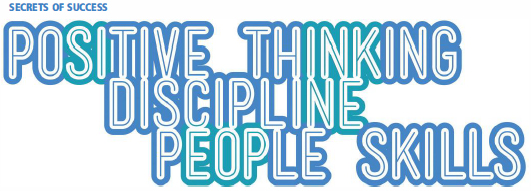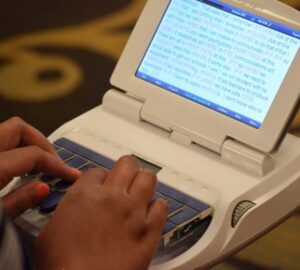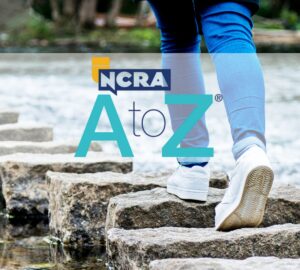
Diane Hromek, RMR, CMRS, has been in the court reporting field for more than three decades. Born and raised in Illinois, Hromek splits her time between Cape Coral, Fla., and Lake Tomahawk, Wis. After seeing an ad for court reporting school at age 16, she received her parent’s permission and started Bryant-Stratton College in Chicago between her junior and senior years of high school. Hromek went on to graduate with a court reporting degree in 1968. She is the owner and manager of Diane Hromek’s Court Reporters and runs her business with the help of her handy BlackBerry, Verizon Hotspot, laptop, and high-speed printer.
How important are credentials and continued education in becoming successful?
Generally speaking, I have never had an attorney ask me about special credentials I have received. They are interested in what I can do and how fast I can get it done. They assume I can do my job accurately.
However, the more education a reporter has, the better. When a reporter is at a job site, attorneys and witnesses expect court reporters to know the basics about a subject. That is why I have always advocated that a reporter take a course in a certain area they may have an interest in, such as securities, real estate, construction, medicine, etc. Also, reading the paper and keeping up with spellings and world events is mandatory. Even sports.
As an owner of a small business, I have needed support or courses addressing how to run a business and related subjects, such as Quickbooks, marketing, taxes, etc. Getting to go to an owner’s seminar would be great.
What would be your advice on building up business in several locations?
Building a business in new locations was tricky. I remember one court reporter who I trained right out of school. She is a great gal. She came from a small town in Illinois far from Chicago. After I trained her, she went home and started her own business in that same small town where she grew up. I understood that and wished her well. Still, my business suffered a loss.
I thought it would be an interesting idea to start a business of taking students from school and then teaching them the ropes for a fee. It takes lots of time to train a new reporter. In our industry, time means money. Just think of how much time it takes to edit a transcript and how much time it takes to train a new reporter. So, to answer the question, establishing a new business in strange places just takes time.
I am now a business owner, primarily, and a court reporter, secondarily. I have owned my own business since 1974. At the time that I made the decision to have my own business, I did the math, thought about the clients who always liked to work with me, and thought if I opened my own business, I would be better off financially. (That is not necessarily true, because being a business owner is way different than being a court reporter. Both need the proper training.)
What are the challenges and rewards of owning a business?
The challenges: Not enough work; too much work; not enough money to pay the bills; trying to make a profit; making sure to follow the rules and regulations or guides for the court reporters; knowing where I stand with the attorneys so as not to get pushed or pulled in the wrong direction; training court reporters; ensuring quality control; meeting deadlines, especially when typing transcripts, which was how transcripts were made at the time. Being a woman business owner alone and dealing with male attorneys.
The rewards: The pride of saying that I own a business, especially for many years, and of finishing contracts honorably; being able to help other reporters; speaking to schools and encouraging student reporters; working as a reporter on amazing cases and meeting people affiliated with them; being in the heart of Chicago politics and Illinois politics and keeping my mouth shut; traveling around the world to report; and earning the monies to live an enriched lifestyle, including the ability to buy airplanes, fly them, pay mortgages on them, and grow to the next airplane – five of them as of this time, one at a time.
What personal traits have contributed to your success?
First, my parents were always there to support me in every way. My father had a business, a used car lot and auto body shop. Ex-Army, he exhibited some traits that I have inherited without realizing where they came from.
My mother, a homemaker, encouraged me every step of the way in everything my sister and I did. She was always there for us, cooking, cleaning, and loving us. We didn’t have to clean or cook so that we could concentrate on school and piano. The philosophy worked so that we wanted to cook and clean and be like mom as we grew older. We didn’t have to be told.
Also, training and discipline to become a concert pianist. Internal drive. The power of positive thinking and my Christian beliefs. Discipline, from playing the piano, to practice.
How has court reporting changed over the years?
We used to type transcripts. I can remember one time, I had several copies that were ordered. I had to use hectograph paper. When I made a mistake, I would have to stop, separate the sheets in the typewriter, take a razor blade and scratch out the error, and then put the sheets back together, hope they didn’t slip, and hit the right key to correct the transcript.
At that time, we had a note puller with a foot pedal. One would step on the foot pedal, and it would activate the notes to progress upward on a slanted easel, over the top, and, if one was lucky, the notes would fold nicely on the other side. If a breeze blew, the notes would scatter all over. It was a lot easier than flipping the steno notes over as we finished typing from them.
At that time, no self-respecting court reporter ever used a tape recorder as a backup. If you dropped, you interrupted. If you interrupted too much, that was a big problem. The attorney was apt to call for another reporter or even interrupt the proceedings to get a different reporter.
Steno machines used to be really light to carry. I think, perhaps, that is why people thought of us as secretaries versus court reporters. As our equipment became more intriguing and our ability to do amazing things with it grew, we earned the respect of being court reporters and were more respected for charging the rates we do now.
There was no such thing as a “dirty disk.” There was an unproofread transcript. That is what was used when doing daily copies when there was no time to proofread transcripts – such as when we typed transcripts through the night to be in the hands of the attorneys before court began the next morning.
Believe it or not, I remember a time before fax machines and copy machines. What wonderful inventions!
Notices of deposition. I suppose those were always there. But now, when I get a phone call or email requesting a court reporter, before the client has a chance to start dictating the job information, I simply ask him or her to fax or email the notice of deposition and the service list with all the information possible about the attorneys of record. I save all the NODs in my computer and send them as attachments to the court reporters who accept the job. The procedure used to be for the court reporter to arrive at the deposition and, after setting up the steno machine, ask the attorney for the caption. By hand, we used to copy it word for word, thus taking long periods of time while the attorneys made small talk and waited politely for the court reporter to finish. We had to ask each attorney for his or her name and who he or she represented. After we assigned symbols for the attorneys for our steno machines, then, 15 minutes later, we were ready to start. At the end of the deposition, we would ask on the record who was ordering a transcript. Now, many reporters use an order form. At that time, it was easy. “Do you want a transcript?” “Yes.” Now, the choices are so many: “Do you want a mini? A concordance? An ETran? A pdf?”
There was a time when smoking was allowed in the deposition rooms. One time, there were five attorneys, a witness, and me. All but one person smoked in that small, closed-door room. I wondered how I would survive such situations in the future. I was 18 and intimidated by just being among attorneys. How was I going to ask them to not smoke?
Attitudes of attorneys toward reporters have changed with the times. There were times that I would rather burst than ask for a bathroom break. People are more relaxed now, such that asking for a recess should be totally acceptable.
What kind of skills are needed to be successful?
People skills! Also dealing with clients. I always lean their way, if at all possible, even if I take a loss. Also with court reporters. If they charge a little extra, even if it is not what my rates are/were, I don’t quarrel. I am so grateful they are willing to work with me. Most are humble and wonderful to work with and willing to bend.
Other skills: Math. You never know when a customer will call and ask for a bid to do a big job. You have to know how to do fractions, percentages, and know your costs so that you can make a profit. Personal temperature control: Always stay calm about everything. Tongue control: Measure what you are going to say. “Treat wisdom as a sweetheart.” (The Bible.) Acknowledge and praise the reporters. We all work so hard! Advertising: Be smart where to put your money. Savings: This is one of the most important things I learned from my accountant: Save. I started a savings account and try to put aside 10 percent of every deposit, just for a rainy day. (Thank goodness, it doesn’t rain too much.) I also dip into this fund at Christmas. Nice to have. Thank yous: Very important key to running a business. Just a little note, handwritten, is all it takes – usually.
What advice would you give a student who is about to enter the field?
Get with an agency that is very busy, one that takes all different sorts of work. Be willing to go to court, take meetings, do things over your head so as to grow. Read at least 50 transcripts from that agency so that you will know their format and clients. Know software for various computer programs like Microsoft Outlook, Quickbooks, etc. Take computer courses. Have your own technician. Hire your own scopist. Start together and grow together. Two of them are even better. That way, if you have a daily copy or a huge amount of transcript to get out right away, there is no delay, and no one gets tired out. Always remain loyal to the agency and be grateful. Be positive. Dress and act professionally. That is half the fun of this job. Allow clients quiet time when you arrive on the job unless they engage you. You are there to serve them. Be half an hour early. Get transcripts in way before they need them. Read the newspaper. I offer my work to the Lord. I am doing a service to mankind when I do a good job, helping people who are in trouble or quarreling over something. The law keeps peace. There were scribes back in Biblical times, and I think there always will be.
What type of advice would you give to an established court reporter who is considering getting out of the field due to changes in the business?
The right answer is to go where your heart is. Right? Still, if you can help someone, keep on going. Life is short. Do what makes you happy. Help others. Maybe the right answer is to close the business.
See what fits each individual person. It takes money to keep an agency going. There are many things to consider: advertising through NCRA or individual websites, the cost of keeping your license or upgrading your software or servicing your hardware. Illinois requires continuing education points. In Florida, I need to renew my notary license at a cost of about $250. The cost of steno software is $750. Quickbooks costs about $220. The cost of my BlackBerry and Hotspot, $340 monthly. Other advertising. Binders. Office supplies. Business cards. Brochures. Other promotional gifts – under $100 per client yearly. It takes time, too, as you (or someone) must be present to take phone calls and respond to emails in a timely manner.
To answer the question again, I believe digital recording in the courthouse has some merit for smaller cases, especially with budget cutting. I understand when there is a fender-bender case, it may not be appropriate to spend a thousand bucks when the total costs of the accident don’t amount to half that. And I could see how important it is to spend the dollars necessary to hire a court reporter for a high-end medical or product case. As a reporter, one better be ready for exciting reporting on cases of more sophisticated matters, which is not a place for a beginner. Also, this is a situation where experience and knowledge come into play. Reading numerous finished transcripts by experienced reporters would be very helpful for young reporters.
Where do you see the court reporting profession going in the future? And how can reporters to prepare for that?
I thought about 10 years ago that reporting would end. But the technology kept it going. I love all the new things I know about computers and technology. I attend seminars to learn the latest. To respond more directly to the question, I believe reporters who are chosen to work on depositions and trials will have to be the most professional ones available, with good speed, accuracy, dependability, professional conduct and appearance, a proper work ethic, so that they can get the job done on time or ahead of time.
I encourage reporters to work three weeks and take off the fourth week every month or at least a long weekend to rest. Lenore Weiss, an agency owner in Chicago who has passed away, said: Never give up an important event in your personal life for court reporting. In summary, I am grateful for the opportunity to share some of my experiences as a court reporter and an agency owner.


















